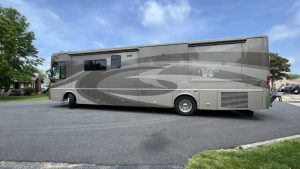Find the RV that is best for you
When starting out, do your research for what best suits your family. There are so many options, go to RV shows, check out local RV Retailers, talk to the professional about your needs, and see what could be your best fit! Caution, new and shiny may not be what is needed for your current lifestyle. A RV in good mechanical condition, that may only need some DYI cosmetic changes. Take your time looking, but when ready take the plunge.
Some Tips For New RVers
Decide why you want to join the RV movement. Check out all of the RV options. Consider the style of RVing and the number of people you will have on trips. You should determine these topics before you purchase your first RV. You need a unit that meets your needs and lifestyle.
Once you have your RV, there will be many things you should know. Several of these things are key to every type of RVer, no matter the rig or where you camp. Like us, you’ll refine your style, and items actually needed as you travel. We call this lessons learned. So, let’s start with a base list of things.
RV Tool Kit
Start refining your tool kit specifically for your RV. You don’t always have a lot of extra space. Select tools that will have multiple functions and make sure you keep them accessible. Tool lists will vary based on your RV. Add them as you need them, so you don’t end up with too many tools on hand. Some general tools might be a measuring tape, a hammer, a drill, and a ladder.
Resourcefulness
Keep your owner manuals close. When you need repair parts or items for your rig, you will need to have specifications to order new parts.
Membership organizations can provide good resources. Learning how to find a mobile repair person is also a good skill to have.
RV Maintenance
Learn how to identify potential issues in your RV. Keep a record of all the work you do, certifications, and licenses in one area.
You should at minimum have a monthly, and annual checklist for your entire RV system. It’s important to note that your system may not be like someone else’s.
Meet other RVers
Get to know other people who live a similar lifestyle to yours. It goes a long way in having someone to turn to for experienced answers.
Take the time to meet your fellow RV neighbors. You can form temporary support systems or even long-term friendships. Peruse RV forums like irv2 and air forums and join social media groups to find information you may need as you travel.
Stay Connected
Everyone needs to be connected now, even if it is just for emergencies. Not all RV parks or areas have wi-fi services or a cell signal available. When you are new to RVing, you will need to decide what level of service you need.
If you work full-time from your rig, you will need to make sure you have redundant services because park services rarely are enough.
RV upgrades
Make a list of upgrades you would like to do but not all at once. This helps with your maintenance and budget planning as well. But be aware as you travel along, some upgrades are necessary.
Budget
Only work on one project at a time with your RV. Starting multiple items can run you off budget due to time delays and unexpected costs. It is also wise to start a new budget for potential emergencies.
Power usage
Not only should you learn how to perform your hookups correctly, but you should also monitor your usage. These will help you in times when you need to plan for resources or find yourself without certain services. You will also want to quickly know how to shut off services in case of emergencies.
RV protection
If you plan on being away from your rig during the day, set up deterrents just like you would on a stationary home. Put monitoring stickers on your windows. Have lights on, and make sure all windows and doors are locked.
Whether you are full-time or you have a rig in storage, set up protection. Most burglaries used to take place at night, but the current stats show that most occur between 10 a.m. And 5 p.m.
Emergencies
Every place you go, you need to be aware of your surroundings. Watch the weather, you may need to put in your awning, and outdoor furniture.
It’s a good idea to make note of local hospitals, police, and fire departments. Bad things can happen to good people, so be prepared. If you have special medical needs or issues, find out where the “doc in box” is located for walk-in service. If you are traveling with a pet, find a vet. And have all your medical paperwork (or pet papers) easily available. And, always have a suitable first aid kit with you for cuts, abrasions, stings, and possibly more depending on your travels. Read local suggestions for support material to have available. The desert region has much different needs than the east coast or snow regions.
